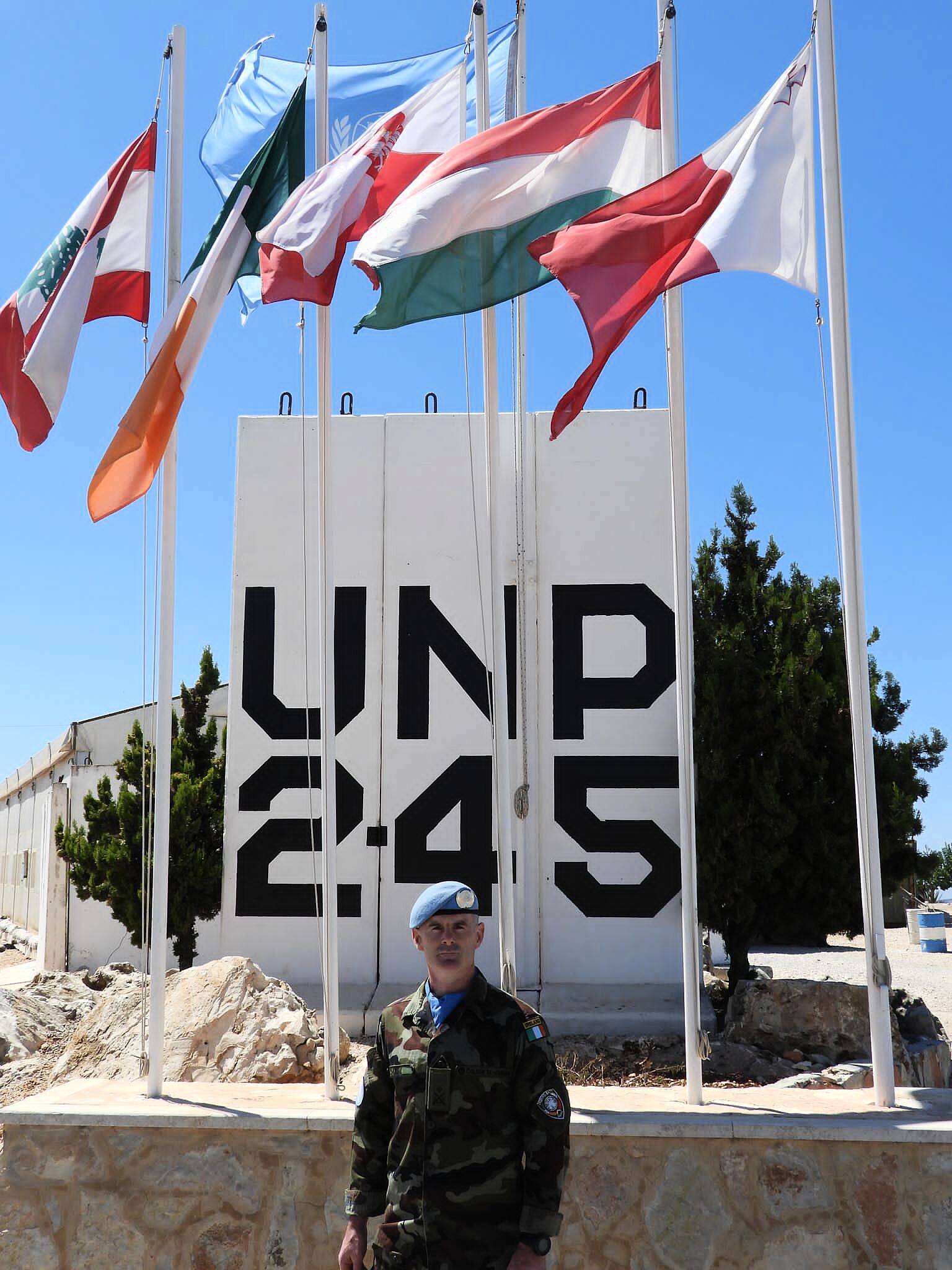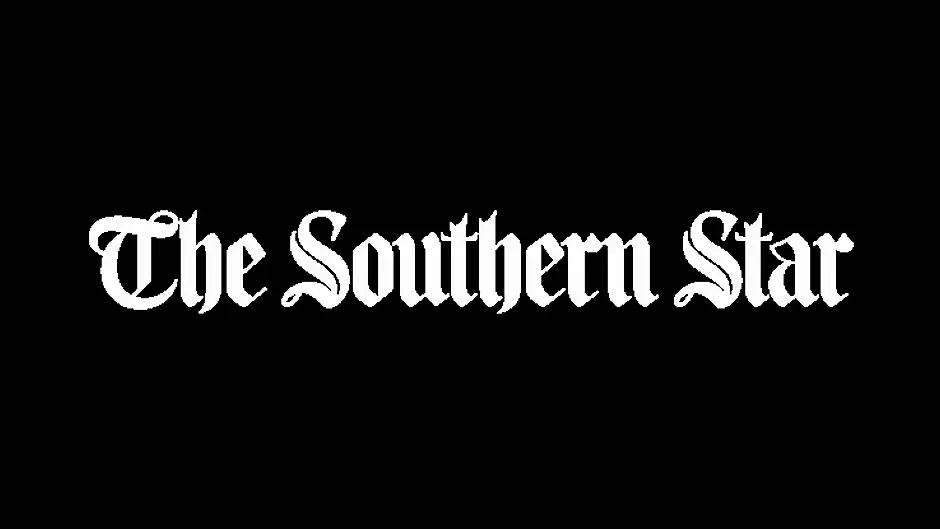West Cork's Cathal Keohane – the officer commanding the 122nd Infantry Battalion in Lebanon – is leading the 348 members of Óglaigh na hÉireann who are currently engaged in peacekeeping on the border with Israel.

THIS is the second tour of duty in Lebanon for Skibbereen man, Lieutenant Colonel Cathal Keohane (47), who lives in Rochestown in Cork city with his wife, Connie, and their children Aoibhinn, Sadhbh, Doireann and Réailtín.
Six years ago, Lt Col Keohane served as second-in-command of the battalion, as part of the United Nations Interim Force (Unifil) mission for the United Nations, but he admits ‘there’s no comparison’ between the two roles.
‘The reality, as commander, is that it’s a different level altogether, but my last job was very good preparation because I was working closely with the commander and could see the stresses that are on the role.’
The stresses on Unifil increased beyond anyone’s imagining when, on October 7th, a Hamas attack resulted in the killing of more than 1,400 civilians in southern Israel and the capture of more than 200 men, women, and children as hostages. Over the last six weeks, the Israeli Defence Forces have been retaliating with an intense air bombardment of Gaza.
Meanwhile, in Lebanon, there have been ongoing exchanges between the Israeli Defence Forces and members of the Iranian-backed Hezbollah. Cathal says the date of the first of these exchanges was October 9th.
‘Tension had been building on the 7th and 8th but it was on the 9th that there was the first open conflict,’ he said. ‘There were exchanges of fire across the Blue Line, which isn’t a border, it is a line of withdrawal from a previous conflict.
‘Once that happened, we did what we have been trained to do. We enacted our force protection measures, which is a set of drills to protect the force. It’s all about risk mitigation, accounting for people, and ensuring everyone is safe within the bunker.
‘Our normal job is to monitor the Blue Line, and the cessation of hostilities, and that has continued,’ he added. ‘Even when we are in bunkers there is a certain element of the unit continuing to observe on a daily basis, and sometimes twice a day.’
Cathal said their use of the bunkers has reduced their operational footprint to ensure people are safe because they are dealing with situations on a daily basis. ‘Since October 9th, the situation in Lebanon has become more tense, more volatile, but the thing that we rely on most is each other,’ he said.
‘We have the equipment. We have been very diligent with regard to training ourselves on the equipment, and our procedures, but the most important thing is the quality of the person to your left and to your right.
‘They have been outstanding in doing what they should do, in doing what they must do, and in looking after each other.
‘People are getting on with it. It has become the new normal, which is strange when there are explosions in your proximity.’
 Lt Col Cathal Keohane from Skibbereen is the officer commanding the 122nd Infantry Battalion, as part of the Unifil mission for the United Nations, in Lebanon.
Lt Col Cathal Keohane from Skibbereen is the officer commanding the 122nd Infantry Battalion, as part of the Unifil mission for the United Nations, in Lebanon.
The Irish government has advised people not to travel to the conflict zone and is providing consular assistance to approximately 40 Irish citizens in Gaza who are seeking evacuation. Lt Col Keohane, who will be returning home at the end of November, said the 122nd infantry battalion – which consists of 34 officers, 304 enlisted personnel, nine members of the armed forces of Malta, and one chaplain – remain committed to their mission despite the volatility of the situation.
Unifil was established by the Security Council in 1978 in response to a surge in violence on the border between Israel and Lebanon, and to provide protection and humanitarian assistance to the local population. The Irish designation is the 122nd infantry battalion but when in Unifil it changes designation. The change is due to the fact that they are working with members of the Polish and Hungarian military, so it is called the Irish Pol Batt – an unit of about 600, all of whom work together to prevent hostilities across the Blue Line.
‘We are soldiers,’ said Cathal. ‘We accept that there are situations that we will face which require resilience, and will be adverse, and we train very hard to mitigate those risks.’
As the commanding officer, Cathal said he is responsible for everything that happens – good, bad, or indifferent. ‘In that context, there is a huge responsibility ,’ he said. ‘We have to make sure that everyone is as well prepared as they can be for the job they have to do, and to make sure that the job is done as effectively as possible.’
He said the troops completed a rigorous training programme before they commenced their six-month deployment last May. ‘We – as is the case with all previous units who deploy on missions overseas – volunteer to go to conflict-torn parts of the world in an attempt to bring order and stability to the people living there.’
He said the battalion is a team that has, at its foundation, four pillars. The first pillar is that each member challenges themselves, and each other, to develop ‘a high performance mindset’. Owning and taking responsibility for solving issues is another tenet of the soldiers, sailors, and aircrew who make up the battalion. Cathal said they work together with an attitude of doing ‘the next right thing’. And the final pillar is to ‘care for each other’ throughout the term of their deployment.
It is these principles that keep the unit psychologically strong but, militarily, they have a range of equipment that protects them too. For example, when they are on patrol they use armoured vehicles and, when in camp, they have access to what Cathal described as a very effective bunker system.
Before October 7th, a huge part of the battalion’s work was representative , but now they, and the incoming battalion, are tasked with keeping the situation as calm as possible. ‘There are risks but they are part and parcel of service in Lebanon,’ said Cathal.
Being away from family is part of the job too. ‘It’s common to everybody,’ said Cathal. ‘It is awful, but it is what it is. You make a decision that you are going to be part of the organisation, and this is part of service life. The reunions are great but the partings are awful.
‘One of the great strengths of the profession is that you meet the very best of people. They are people who have made a choice that they are going to dedicate a portion, at least, of their life to the service of Ireland, which is an incredible thing.
‘They put so much of themselves into what they are doing that it would be a failure to leave them down.’ This is Cathal’s seventh deployment in his military career. He has been to Africa twice and spent nine months in Bosnia . His second deployment to Lebanon means he has now spent one year in country, plus 15 months in Sweden , and 15 months in Germany.
‘It is not an ordinary job,’ he said. ‘It is difficult to describe in words because it is particular to the military environment. We have extreme ownership of what happens. You are not just the boss from 9 am to 5 pm. You are on all the time 24/7 and that is just the way it is.’
Cathal, the son of Charlie and Mary Keohane, said his grandfather served in the Local Defence Forces – a precursor to the FCA – during The Emergency, but that he is the first in his family to enlist. Straight out of school, he joined the 71st cadet class in October 1994, and was commissioned to the 30th Infantry Battalion in Kilkenny in July 1996. As an infantry officer, he has held a variety of command and training appointments and has undergone extensive professional military education.
Cathal holds a bachelor’s degree in civil engineering from the National University of Ireland Galway, and a masters of arts degree in leadership, management and defence studies from Maynooth University.
‘From the age of four that is all I wanted to do with my life,’ said Cathal, who is due to hand over command to Lt Col Stephen MacEoin when his tour of duty comes to an end.
 Safety and training, and the use of armoured vehicles, is paramount for the 348 members of the 122nd Infantry Battalion which is currently serving in Lebanon.
Safety and training, and the use of armoured vehicles, is paramount for the 348 members of the 122nd Infantry Battalion which is currently serving in Lebanon.
As that battalion prepares for the next peacekeeping rotation, Lt Col MacEoin said the mandate for the Irish troops is to maintain vigilance on the Blue Line and to observe, monitor and report any infractions, but also to protect civilians.








